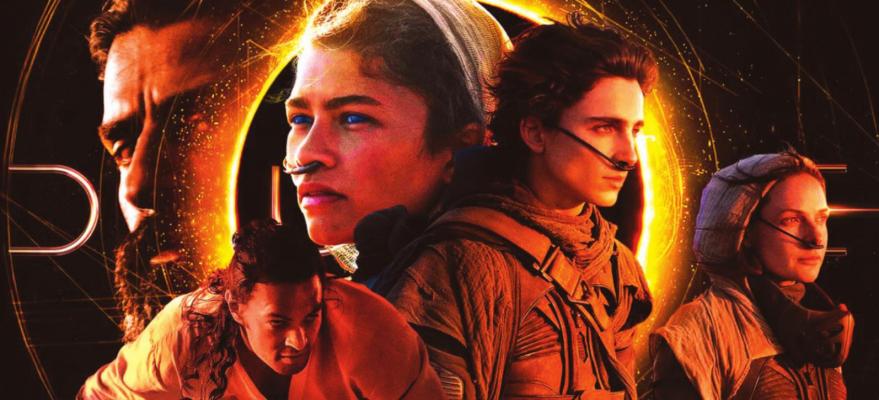‘Dune’ review:
Epic visuals and a savior story in need of some spice
Gorgeous, grand and totally impenetrable, “Dune” is a very big movie for a very small audience.
Hardcore sci-fi heads and faithful devotees of Frank Herbert’s 1965 novel will huff it like the precious spice at the center of the story. Others will feel like they’re on the outside looking in, awed by director Denis Villeneuve’s craft and operatic grandeur but mystified by the insularity of the storytelling, which is as dry as the desert world in which the story unfolds.
This tale, set really far in the future, takes place on the planet Arrakis, a sand-covered land like the second level in “Super Mario Brothers 3.” Arrakis is home to a sacred hallucinatory substance known as “spice” — technically, you could call this a “Spice World” — and that spice is the key to life and enlightenment for what remains of humanity in the year 10191.
Harvesting that spice — it’s seriously called “spice,” which no matter how many times you hear it is never not funny — is up to the Duke of the House Atreides, Leto (Oscar Isaac, who is in most movies these days), who comes to Arrakis to oversee and overtake the planet’s spice operations, after another ruling body, the Harkonnen, is forced out.
But there’s more to Arrakis than just its spice; in addition to the giant worms that inhabit the planet and rumble just below the surface of the sand, there are tons of really boring politics, which make the trade federation scenes in the “Star Wars” movies look like light saber battles. (It basically boils down to a metaphor for colonial rule.)
Leto’s son, Paul (Timothee Chalamet), is along with his father for the trek, as is his concubine (and Paul’s mother), Lady Jessica (Rebecca Ferguson); Javier Bardem, Dave Bautista, Zendaya and an unrecognizable Stellan Skarsgard, buried beneath what looks like 100 pounds of latex skin, also show up to play in the sandbox.
Paul is a young whipper snapper with big ambitions who sees himself as a leader. He’s treated like a kid brother by Duncan Idaho (Jason Momoa), a warrior hero whose statederived name is as unlikely as quarterback punk-turned-FBI agent named Johnny Utah, who roamed Earth some 8,000 years earlier. Paul wants to join Duncan in battle, but Duncan basically musses his hair and tells him to go back to playing with action figures.
But Paul is more than some mere wannabe. It becomes clear over the course of the story that he’s the Chosen One, the Jesus Christ/Luke Skywalker/Neo of this story, depending on which mythology to which you subscribe. And since two of those three references came in the wake of Herbert’s novel, perhaps we should be looking at them the other way around.
Yet “Dune” isn’t as accessible as its descendants “Star Wars” or “The Matrix,” it’s stiff and distant in ways the others aren’t. They all share commonalities, hero-savior stories about chosen prophets sent to save the world, but “Dune’s” mythology and world-building renders it out-of-reach for most. It’s for fans and by fans, catering to those who already have a nose for it.
So why make “Dune” again at all? David Lynch’s 1984 adaptation was famously troubled, a box office stinker that was disowned by its director and became shorthand for a certain kind of disaster. This “Dune” — which carries a reported budget of $165 million, and looks every cent of it — is tackled head-on by “Arrival” and “Blade Runner 2049” helmer Villeneuve, Hollywood’s foremost contemporary blockbuster architect not named Christopher Nolan, who gives it an appropriately epic look and feel.
But to what end? Outside of its pristine aesthetics, there’s nothing here to grab onto, with little emotional or human connection to be made with the material. (The film does manage to put a forward spin on aviation, presenting helicopters with wings that flap like an insect’s, a fascinating rethinking of flying machines.) Perhaps those who have done the assigned reading will find it rewarding, but for those who skipped the homework, the questions won’t make a whole lot of sense, let alone the answers.
“Dune” — this is only part one of the story, part two is supposedly on the way — should be praised for its rich technical achievements; it’s one of the best-looking movies of the year and its visual and sound effects deserve to be experienced on as big a screen as possible, as “Zero Dark Thirty” and “Rogue One” cinematographer Greig Fraser’s scope is massive and Hans Zimmer’s score is bone-rattling. But the movie is a bit like picking up a small pile of sand: no matter how hard you try to hold onto it, once it sifts from your grasp, all you’re left with is an empty hand.

